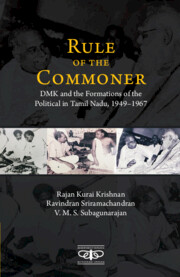3 - Human Immanence
Published online by Cambridge University Press: 15 June 2022
Summary
Rather the question is what sources can supportour far-reaching moral commitments to benevolenceand justice.
—Charles Taylor, Sources of the Self: The Making of the ModernIdentityWe have postulated, through the first two chapters,that the populist logic that informed the DMK is thehegemonic assertion of non-Brahmin–Dravidian (thepleb) as Tamil (the populous) through dismantlingthe Aryan–Brahmin hegemony established in TamilNadu. If the name of the people, Tamil, the emptysignifier, is not to eclipse the internal frontiernecessary for the counter-hegemonic assertion, thecatachrestic naming of the non-Brahmin Dravidian asTamil is to be complemented by the synecdochic claimof Tamil Nadu to aspire for a Dravidian republicthat spread all over peninsular India. What we needto consider is that while this can be the populistlogic, whether such counter-hegemonic assertion canbe made without recourse to certain appeal to ahistorical sense of change, which came to be knownas “modernity” or “modernization.” The populistlogic will not work effectively if it does notinvolve what Charles Taylor has called the forgingof a new social imaginary which is involved in themaking of a modern identity through locating a rangeof sources of the self in tradition. Our postulatein that regard in this chapter is that the DMKmanaged to make connections, imaginatively andcreatively, to sources in Shaivite metaphysicwithout having to yield to the Tamil nationalistprodding of neo-Shaivites of the nineteenth andearly twentieth centuries, as argued by some.
We need to recognize that in the Tamil instance, thecreation of modern social imaginary with appeals totraditional sources of the self was fraught withinnumerable conundrums because the core of theimaginary consisted of removing caste from thepublic sphere by either sequestering it to theprivate lives or annihilating it fully to fashion acaste neutral self. This entailed a need torepudiate, challenge, or at least criticallyinterrogate traditional Brahminical mores enmeshedwith practices of rituals and piety. This placed ahuge demand on political actors of all kinds to makea statement on where they stood in terms faith,belief, customs on the one hand, and humanist credoand scientific rationality on the other.
- Type
- Chapter
- Information
- Rule of the CommonerDMK and Formations of the Political in Tamil Nadu, 1949–1967, pp. 63 - 84Publisher: Cambridge University PressPrint publication year: 2022



